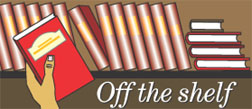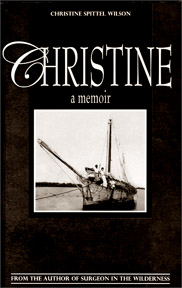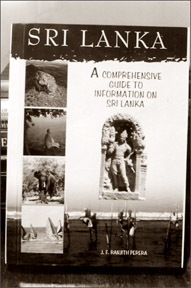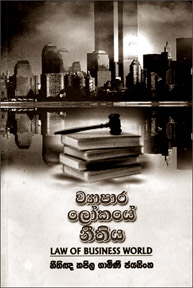A lasting tribute to Sri Lanka from a British Sri Lankan
Christine Spittle Wilson, Christine, a memoir:
by Ranga Chandrarathne
  Christine
Spittle Wilson, daughter of famous Dr. R.L Spittle, a man who perhaps,
described as anthropologist and brilliant literary figure, has come out
with her memoirs, capturing the very formative years she spent under the
shadow of her father travelling into the wild and her eventual return to
Sri Lanka. Christine
Spittle Wilson, daughter of famous Dr. R.L Spittle, a man who perhaps,
described as anthropologist and brilliant literary figure, has come out
with her memoirs, capturing the very formative years she spent under the
shadow of her father travelling into the wild and her eventual return to
Sri Lanka.
Candid in diction, 'Christine, a memoir' not only codifies an
important period in pre-colonial Sri Lanka but also looks intimately
into social life of the Colonial administrators in Sri Lanka, pangs of
Second World War, bombing of Colombo by Japanese and many other events,
from a perspective of a truly British Sri Lankan.
Eventually, the Spittle family settled down in Colombo in a house, in
Cinnamon Garden known as 'Wycherley' which now houses primary section of
Wycherley international School. The house witnessed many an important
event not only of Christine but also of Sri Lanka as it was virtually
turned into a hospital during the height of the Second World War,
especially Japanese dropped bombs on Colombo.
'Last night I dreamt I saw Kaira again. He stood before me as he had
stood long ago, bare-bodied, his wild hair clotted on his shoulders, his
skin grayed with the dust of age, and even in my dream I saw, above all,
the wild eyes with the look of a stricken animal. The Child my father
had saved from the jungle and brought home to be my play mate.
I shake the vision from my thoughts. Outside my window two crew
pheasants call, the deep note of the male answered by the softer one of
the female.
At some time during the day the two calls will come from a single
branch, but now, a Koha joins them with a different song. So thoughts
come and go, each reiterating in some way the other. The past slides
into view, clear, clearer than the present writes Christine before
commencing her fascinating journey into the past which invariably
constituted an important part of the collective memory of the nation.
Among other interesting passages, Christine recalled her childhood
play mate Kaira, a Veddah boy brought to Colombo by her father. Although
the Veddah boy leant elementary letter and numbers, he was stranded in
the wilderness of concrete civilisation and eventually Kaira escaped
into the madning crowd.
'Through letters I learn that all was not well at home with Kaira.
They said he was getting plump and lazy; he was insolent to one of the
nurses in the nursing home, who complained to my father.
They said a watch another nurse left on her dressing table had gone
missing. The next morning Kaira was gone. Caught few days later, he was
sentenced to three years at the Penitentiary. 'Reminiscent of Kaira and
the failed experiment by her father to tame a wild boy.
One of the commonalities between father and daughter is that both are
much closer to the Veddas and enjoy occasional sojourn in the wilderness
of Sri Lanka studying the Veddas' life. The book also records brief but
exciting time Alistair and Christine spent in Africa before making a
decision to return to Sri Lanka for good.
Unexpectedly the question arises: 'What would my father have said if
he were alive.' The question remained unanswered, but later I woke as if
he had spoken.
He would have said out of his great knowledge, the choice is yours.
But remember wherever you have been, whatever you do, there are halls of
gold in our island. Remember the vast caves in our forests, large enough
to house a cohort of soldiers, and inscribed with the ancient pali ward,
'To Tissa beloved of the gods'.
Remember, a great rock-hewn swimming pool, with a cobalt reflection
of the sky. I remember things the present generation has never seen, but
you have. writes Christine on their decision to return to Sri Lanka.
Candid in diction, Christine writes her life and time in Sri Lanka in
a most heart rendering manner, taking readers through her chapters of
life from the Second World War to the time she spent in Africa, her
memorable childhood spent at Wycherley and her journeys into the wild
with her surgeon father.
'Christine, a memoir' is a must read for all Sri Lankans who love
this country and are enthusiastic to learn the post-colonial history of
Sri Lanka and the immense contribution expatriates made to make Sri
Lanka for what it is today.
[email protected]
Fifty is company
Sandya Tukuram
 Ilica
Malkanthi Karunaratne is a journalist who has been writing for well over
forty years. She began her career at the Sun Newspaper under D.B.
Dhanapala. A subsequently glittering career as the wife of a minister
under both J.R. Jayewardene and R. Premadasa did not prevent her
pursuing her first love, writing, and she continues to do so to this
day. Ilica
Malkanthi Karunaratne is a journalist who has been writing for well over
forty years. She began her career at the Sun Newspaper under D.B.
Dhanapala. A subsequently glittering career as the wife of a minister
under both J.R. Jayewardene and R. Premadasa did not prevent her
pursuing her first love, writing, and she continues to do so to this
day.
This love of writing is immediately obvious in her first book, Fifty
Is Company. It is not merely a collection of fifty interviews the author
has conducted over the years, giving facts and figures about the various
personalities therein: in other words it is not merely journalism.
There is a gentle quality about the writing, where you feel the
author is genuinely trying to come to grips with the personality
involved, trying to understand the various twists and turns that have
brought the subject to where he or she is today.
And this fact is indeed striking when you read the book: how so many
of these successful people seem to have got to their present position by
the merest whim of fancy or chance!
In addition this commentary is laced with Ilica's own opinions, which
are never too judgemental, and full of sound common sense, and the
writing has a simplicity and great elegance of style which many a
verbose young writer of today would do well to emulate.
But if you think this book is all sweetness and light and will put
you to sleep after five minutes, think again. In amongst all those
polished phrases and general bonhomie there are some well-aimed and
juicy barbs that will take your breath away by their sheer wit and
unexpectedness!
A critique is not a critique however without some form of criticism.
What did strike me is that Ilica's choice of fifty people is a rather
eclectic one. Of course there are many of the great and the good
included. But the book is notable as much for its omissions as for its
admissions.
There are many people whom you would expect to be in this book who
are not; and by contrast there are some very dark horses in this race,
nightmares even! But these fifty people are the ones who in Illica's
opinion will shape our behaviour, for better or worse, in the twenty
years to come: the way we dress, the food we eat, the books we read.
Most especially the way we think.
And if Ilica has chosen to put good money on them, let us all take
note: her judgement has proved uncannily accurate in the past. Even
those very dark horses may romp home yet, with a comfortable three
lengths to spare.
In-depth information on Sri Lanka's burgeoning hospitality industry
by R. S. Karunaratne
 "Helvetica"
TOURISM: Tourists, tour operators, tourist hotels, tourist guides,
students following courses in tourism and others interested in this
subject will be delighted to have access to a comprehensive guide to
information on Sri Lanka. "Helvetica"
TOURISM: Tourists, tour operators, tourist hotels, tourist guides,
students following courses in tourism and others interested in this
subject will be delighted to have access to a comprehensive guide to
information on Sri Lanka.
The monumental work running into 583 pages has been compiled and
edited by an authority on the subject. He is J. F. Ranjith Perera who
was one time Administrative Assistant and later Director General and
Competent Authority of the Ceylon Tourist Board. He has wide experience
in the tourist industry here and other foreign countries in Europe,
South East Asia, North Africa and North America.
Tourist guides published in Sri Lanka were mostly travel guides or
pictorials. Sometimes the emphasis of such publications was on cultural
tourism. However, the current publication covers diverse topics such as
geographical location and climate, social profile, the economy, the
government, the banking and financial systems, Sri Lanka as an
investment destination, the legal systems of Sri Lanka, the history of
the island, and the sources of Sri Lankan history.
Section 2 deals with cultural tourism, nature tourism, adventure
tourism, and spiritual tourism. This section gives a detailed account of
world heritage sites declared by the UNESCO, sites and things of
touristic interest at various tourist destinations. Under nature tourism
the author gives a graphic account of the national parks, fauna and
flora.
Adventure tourism is mainly targeted at foreign tourists who would
wish to know details of adventure destinations, adventure sports,
trekking, golf and wind surfing. These are necessary to sell Sri Lanka
as a tourist destination.
This is perhaps the first tourist publication that promotes spiritual
tourism. In this section different types of meditation are discussed.
Apart from meditation, Meththa Bhavana or Ana Pana Sathi Bhavana, the
author gives us a full list of monasteries teaching and practising
authentic meditation.
The book opens with the National Anthem of Sri Lanka. It is followed
by brief sketches of the National Flag, the National Tree, the National
Flower, the State emblem, and a traditional greeting to the visitor to
this enchanted island.
Some of the information found in the book is good for any average
student who wishes to know the names of our rivers, catchment areas, and
water falls. The social profile deals with the ethnic distribution of
the people, their religions, literacy rate and density of population.
The author has given the essence of all the religions practised in
Sri Lanka. Writing on the country's economy the book explains various
trends in economic growth and traces the history in the post
independence era with special emphasis on Mahinda Chinthana.
The chapter on "Sri Lanka as an investment destination" is timely. It
gives the economic policies and investment opportunities available in
the island. Meanwhile, "Sri Lanka's hydraulic civilization" spells out
the rise and fall of the ancient system of irrigation.
"Authentic Sri Lanka cuisine" will titillate the taste buds of
tourists coming to Sri Lanka. Since the government has recognised the
potential of tourism industry, books of this nature should be promoted
locally and overseas.
Tourist hotels should have at least a few copies of this book for
visitors to read because some of the staff members are woefully unaware
of tourist information. On another level this volume can be treated as a
book of history. It gives a graphic account of the history of Sri Lanka
from the pre-historic period upto the present.
It is amazing to see that the island had been ruled by nearly 200
kings. A short review of this nature cannot do justice to a volume that
has dealt with so many subjects relating to tourism. As Sri Lankans we
should be proud of this book which has not left out any important
details.
For the record I will mention a few more topics included in the book:
ancient literature, masks, handicrafts, puppetry, national festivals,
architecture, coins and maps. I am sure anyone who lays his hands on
this book will be tempted to visit this thrice-blessed island.
Amuthu Mama children's novel with a moral message
by Ranga Chandrarathne
Amuthu Mama, children's novel by young talented writer, journalist,
and a dramatist Janapriya Jayasinghe is a candid attempt by the author
to fulfil a long-felt need in Sinhala literature for children's novels.
Though belongs to a genre of thriller, Amuthu Mama is different from
other Sinhalese children novels which were modeled on western thrillers
or translations such as Treasure Island. Janapriya Jayasinghe's attempt
is commendable as it tries to raise curiosity of the children in a
spirit to lead them on a journey of discovery.
It is something that Sri Lankan children lost since the parents
started to coach them for examinations, totally disregarding other
faculties such as sports, music and ability to appreciate nature and art
that in the long run led to the birth of generation of socially misfit
professionals devoid of human qualities.
Process of education should not confine itself to producing robotic
professionals, especially medical doctors and engineers but also a
process which would build character of children with a sense of justice.
Here Janapriya tries to explore complex network of human relations in
a much more humane manner with a moral message lased to it. He
understands the inherent strengths in youth and attempts to take
contemporary Sri Lankan youth out of the confines of consumerism which
has, in a way, confined their lives to a set- schedule of studies,
clubbing and attending tuition classes with prime aim of becoming
professional such as a medical doctor or an engineer.
This creation of a genius shed light on myriad aspects of children's
literature in Sinhalese medium and the writing coerce children out of
their customary milieu to rejoice and explore life. Janapriya attempts
to build a healthier world for children who are traumatized since they
are compelled to engage in the rat race.
The book provides a creative outlet for everyone who is wired in this
desolate valley of tears where they are seared in the flames of
withering injustice. Janapriya Jayasinghe is a journalist by profession.
Viyapara Lokaye Neethiya
(Law of Business World), a practical guide to
business law:
by Indeewara Thilakarathne
 The
latest book by Attorney -at-Law Kapila Gamini Jayasinghe is a timely
publication in Sinhala as it would be immensely beneficial to lawyers,
businessmen and general public as a practical guide book to business
law. The
latest book by Attorney -at-Law Kapila Gamini Jayasinghe is a timely
publication in Sinhala as it would be immensely beneficial to lawyers,
businessmen and general public as a practical guide book to business
law.
The book covers the business law in the areas from Law of Contracts
to Registration of Companies and laws with regard to leasing and
settlements. Though there are a large number of publications in Sinhala
on Business Law, it is rare that a book on application of business law
in real life situations, has been available that would provide laws in
specific areas affecting the most day-to-day transactions in the world
of Business.
The book will fulfil important requirements for a guide book on
theoretical and practical application in laws relating to business in
the Sinhala medium. It will be of great aid for students of Business
Administration, lawyers who could use the book as a reference and
practical guide and serves an educative tool for general public and
business men.
Kapila is a multifaceted personality who excelled in diverse field
including fiction and drama, law and in the arena of journalism. He is a
practising lawyer and authored several books on the application of law
including Adineda Jevitayata Neethiya (2005), Sivil Neetiye Nawa
Prawanata (2006) and Neetiye Prabawa ha Ayatana (2007).
|
